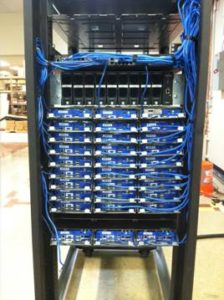
The Liquid-Cooled Aquarius Rack from Aquilla based on the OCPV2 form factor
Today Aquila announced a fixed-cold-plate, liquid cooled Open Compute Platform (OCP) rack. With patented third-generation cooling technology designed and licensed by Clustered Systems, the Aquarius rack delivers high compute density and extreme energy efficiency. Other benefits of Aquarius include: enhanced reliability and robustness, near silent operation, unparalleled ease of use, and the industry’s best ROI and TCO.
The drive towards Exascale computing requires cooling the next generation of extremely hot CPUs, while staying within a manageable power envelope,” said Bob Bolz, HPC and Data Center Business development at Aquila. “Liquid cooling holds the key. Aquarius is designed from the ground up to meet reliability and the feature-specific demands of high performance and high density computing. Our design goal was to reduce the cost of cooling server resources to well under 5% of overall data center usage.”
Aquarius is designed for long-term reliability and re-use, allowing customers to launch their next-generation servers on the platform with only minimal re-engineering. The rack features a forward-looking OCPV2 form factor and is able to directly attach to existing warm water infrastructure at datacenter facilities. Aquarius solutions can run off the warm water exhaust of chiller doors, allowing for additional server expansion where traditional cooling infrastructure is already at full capacity.
The advanced water-cooled rack platform provides several competitive advantages:
- Up to 50% energy savings on the overall server power envelope, allowing for the additional cost of the rack to be recovered within the first year of power savings.
- A near zero failure rate due to the increased thermal stability provided by liquid cooling at semiconductor thermal junctions. This compares to a server failure rate of between 4-8% when using forced air.
- A 5 to 10x increase in server density, with up to two 2.5” HD or SSD drives at each node, supporting fully virtualized storage applications and hybridized storage approaches equally as well.
- Up to a 5% increase in overall energy efficiency and reliability, achieved by eliminating all fans and individual power supplies, thereby removing two of the most frequent points of failure, especially at scale.

Aquilla server proto-tray with compliant Thermal Interface Material. Tray simply slides in and out. No quick disconnects for water or coolant are required as with other liquid cooling solutions.
The Aquarius design is an innovative departure from other non-immersion liquid cooled solutions that use liquid cooled heat sinks. The Aquarius manifold and fixed cold plate design eliminates the possibility of leakage during compute servicing, as there are no plastic tubes or quick disconnects above or near the servers. The fixed cold plate and robust manifold design uses no dissimilar metals, eliminating the potential for water contamination and metal corrosion that could cause leaks.
Compute power requirements for HPC, mobility, OpenStack, and SDN data center applications continue to escalate the need for solutions that address density. And data centers cooled with air in a conventional fashion have fundamental restrictions on power density,“ explains Phil Hughes, Clustered Systems CEO. “Warm water liquid cooling has none of these restrictions and can be packed very densely, without a need for specialized building. In addition to a reduction in overall expense, an organization is not burdened with a large, slow-to-depreciate property. Our servers provide the lowest CapEx and OpEx in the industry.”

Under the patented TIM is the off-the-shelf S2600KPF dual socket XEON E5-2600V3/V4 motherboard with the aluminum heat risers that touch the TIM, and ensure co-planarity / heat transfer to the cold plate (any chips/devices over 2 watts has a riser). Aquila eliminates all fans with their design, delivering 95% or better efficiency in both the cooling and server power usage.
The Aquarius solution represents an order of magnitude improvement over even the most efficient forced air-cooled rack systems:
- Capable of cooling over 100kW per rack, compared to the nearest competitive solution, CoolIT at 40-50kW per rack (also a more costly solution).
- Provides the densest solution available at 108 servers, compared to the nearest competitive solution, Penguin Tundra (cooled by Asetek) at 96 servers.
- Offers 95% or better power efficiency by eliminating the need for cooling fans and inefficient individual server power supplies, and by cooling all server components over 2W (not just the CPUs and RAM). The nearest competitive solutions provide between 60%-70% efficiency.
Production Aquarius server racks will begin shipping in the third quarter of 2016 and will be featured in Aquila’s booth at SC16 in Salt Lake City, Utah, in November.




